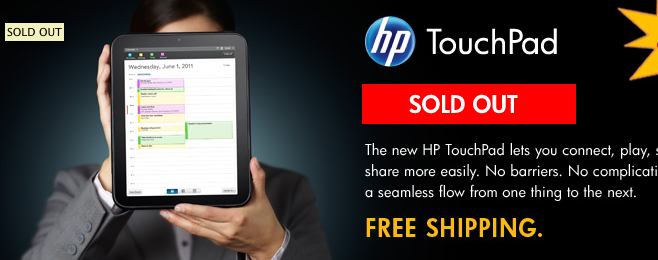The six biggest things I learned during the HP TouchPad's fire sale weekend

When HP formally cut the cord on its WebOS hardware ambitions, most thought that interest in the tablet would fizzle out and die--and it should have. But then HP dropped the price of the 16GB TouchPad model to $99 and all hell broke loose. Here's what I learned in the ensuing 48 hours.
A bargain is a bargain is a bargain
A few days ago, no one wanted anything to do with the TouchPad. Consumer interest was tepid, journalist reactions were on the whole negative, and HP itself was so uncommitted that it discontinued the tablet less than seven weeks after it was released. And yet, despite those things, and in spite of WebOS's uncertain future, consumers actively sought and purchased the recently-killed hardware. Irrational? Probably. But the spike in consumer interest proved that any price drop of such magnitude is bound to generate some consumer interest - even if that interest was virtually nonexistent days before.
There's something special about $99
I don't know what goes on psychologically, but when the average person sees a $99 price tag, something in their brain clicks. Eyes light up with dollar signs and hearts beat with a certain kind of deal-hungry fervor. The same thing happened to me, which is why I found myself biking all around town in search for a device that I didn't actually want. There was a thrill, and a mostly irrational lust to save money on something I had no intention of buying hours prior.
My thinking was this: At $499, the TouchPad was an investment with a minefield of risks. At $99, it's was steal.
News of a sale travels fast
Somehow, between the time the news of the TouchPad's price drop hit and Saturday afternoon, every single available TouchPad was purchased. Staples, P.C. Richard & Son, RadioShack -- every retailer either reported the tablet "out of stock" or "unavailable." How did so many people get word of the sale so quickly? I'm still not sure.
The Apple...TouchPad?
A part of me can't help but suspect that a large part of the TouchPad's popularity this weekend derived from the device's overwhelming aesthetic similarities to the iPad. I have no evidence for this, but its not difficult to imagine a scenario wherein consumers heard the word "Pad" and immediately envisioned Apple's tablet. But that's not what they got. Not by a long shot.
The key to dethroning the iPad is in price
If anything is certain, it is this. Some have used the TouchPad's post-mortem "success" to suggest that Amazon may price its own tablet at around $99. And I'm inclined to agree. At $99, the barrier for entry is almost nonexistent, and it's sad that this is what it took for the TouchPad to achieve any modicum of success. If Amazon doesn't want its tablet efforts to follow in the footsteps of HP's, it will will study closely what happened with the TouchPad this past weekend.
The future of the TouchPad is...Android?
- Why HP’s latest move was more ballsy than moronic
- HP acquiring Autonomy - is this HP’s IBM moment?
- CNET News: HP’s Carly Fiorina era is finally over…good riddance
- A tale of two failures: Microsoft’s Kin and HP’s TouchPad
- HP’s WebOS conundrum: Sell the IP or try licensing?
- HP’s Apotheker recounts TouchPad disaster in post mortem
- HP punts on WebOS, discontinues TouchPad, cuts outlook
